Two Nations, Indivisible
We're an incredibly divided country but splitting it into two is impossible.

A breathless Daily Mail headline blares “America thinks the unthinkable: More than half of Trump voters and 41% of Biden supporters want red and blue states to SECEDE from one another and form two new countries, shock new poll finds.” It’s a reputable poll (more on that later) and the results are indeed stark:
According to the analysis from the University of Virginia‘s Center for Politics, 52% of Trump voters at least somewhat agree with the statement: ‘The situation is such that I would favor [Blue/Red] states seceding from the union to form their own separate country.’ Twenty-five percent of Trump voters strongly agree. Meanwhile, 41% of Biden voters at least somewhat agree with the sentiment, while 18% strongly agree.
Having followed polling and political attitudes in general for a very long time now, I’m less than shocked by the findings. Indeed, I’ve seen many an OTB commenter over the year express this sentiment.
Alas, while the 2000 election cemented in our minds the idea of Red and Blue states, the reality is much more complicated. Because we allocated Electoral College votes in most states on a winner-take-all basis in all but two cases, and most states reliably go the same way quadrennial after quadrennial, it’s a useful concept for analyzing Presidential elections and, to some degree, the gerrymandering of House seats.
But let’s look at last November’s election. As an analysis by USA Today reminds us, most of the country is purple:
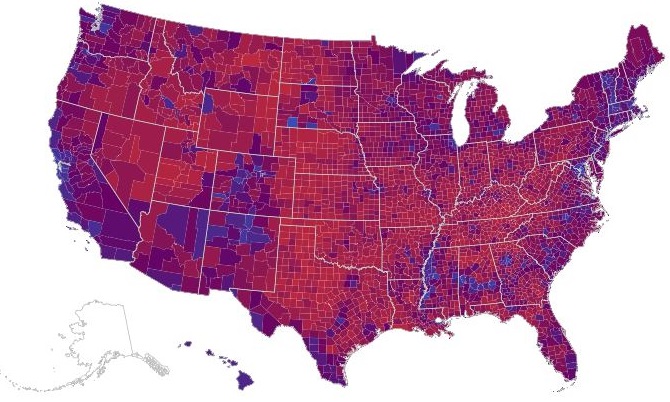
Many counties voted overwhelmingly for Biden or for President Donald Trump, but much of America fell somewhere in the middle. Fewer than 600 out of about 3,000 counties, not including Alaska, voted over 80% for either candidate.
Even that map, though, doesn’t tell the whole story because counties vary wildly in population. This second visualization from the same source demonstrates just how starkly:
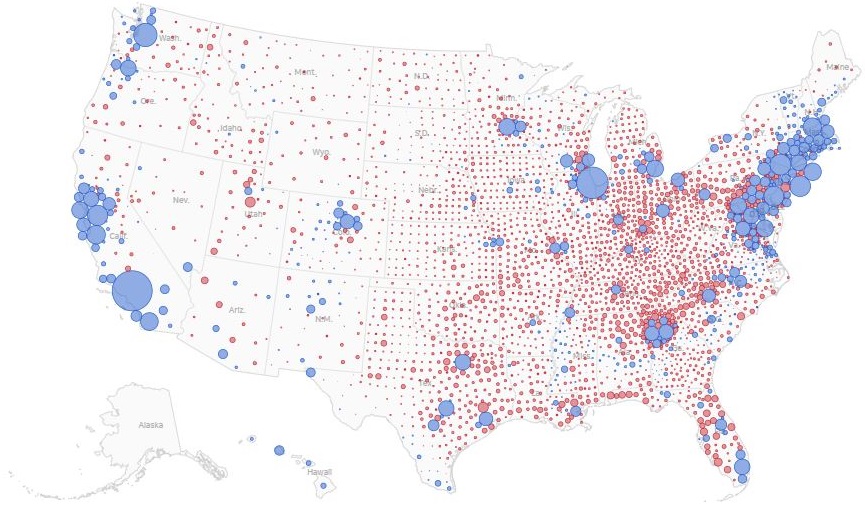
Vast swaths of the country are essentially unpopulated forests, farmland, or deserts. (Both of the live maps at the USA page are interactive.)
The point of all of this is that, like it or not, there is no plausible way for Red or Blue states to secede. As has been noted here more than once, the real divide isn’t Red states and Blue states but rural and urban.
Still, the starkness of the divide is something to see. Moreover, turning to a debate that’s been ongoing in the comment section here for some time, despite the fact that the Republican Party has undeniably been more aggressive in bending the rules to get what it wants and thereby thwarting the democratic process, supporters of both parties have strong authoritarian tendencies.
The above-mentioned poll, a collaboration with UVA’s Center for Politics, led by Larry Sabato, and something called Project Home Fire (“a new initiative dedicated to finding common ground in American politics”) has some disturbing findings.
The topline takeaways:
— Majorities of Trump and Biden voters express support for several elements of the bipartisan infrastructure and reconciliation bills being debated in Congress, but there are marked differences in their levels of support. (see Table 1 below)
— Majorities — often large majorities — of both Biden and Trump voters express some form of distrust for voters, elected officials, and media sources they associate with the other side. A strong majority of Trump voters see no real difference between Democrats and socialists, and a majority of Biden voters at least somewhat agree that there is no real difference between Republicans and fascists. (see Table 2 below)
— Significant numbers of both Trump and Biden voters show a willingness to consider violating democratic tendencies and norms if needed to serve their priorities. Roughly 2 in 10 Trump and Biden voters strongly agree it would be better if a “President could take needed actions without being constrained by Congress or courts,” and roughly 4 in 10 (41%) of Biden and half (52%) of Trump voters at least somewhat agree that it’s time to split the country, favoring blue/red states seceding from the union. (see Table 3 below)
While just released, this is based on polling conducted between July 22 and August 4. I wouldn’t be shocked if polling taken today wasn’t even more pronounced.
Let’s break things down further. Table 1:
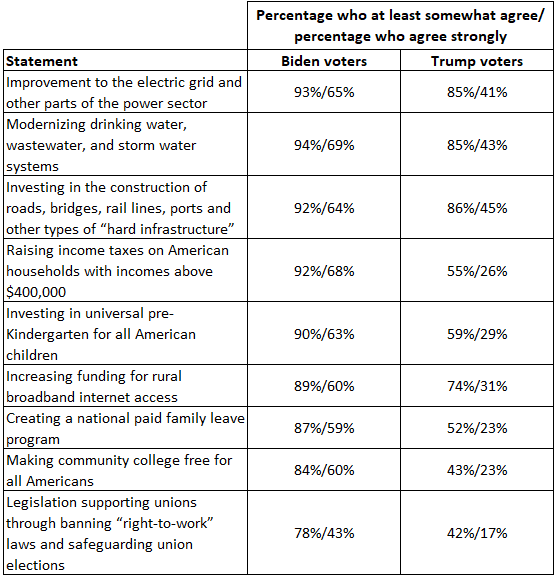
So, on the positive side,
Policy-wise, Biden and Trump voters do express some commonalities. As an example, and thinking about some of the aspects of the infrastructure and reconciliation bills currently being debated in Congress, only two garner less than 50% support from Trump voters: legislation supporting unions through banning “right-to-work” laws and safeguarding union elections (42% of Trump voters express support), and making community college free for all Americans (43% of Trump voters express support). In other words, majorities of Biden and Trump voters express support for several other elements of the infrastructure and reconciliation bills currently being debated in Congress, although Biden voters express stronger support for these issue statements than Trump voters do.
And this provides some support for the David Brooks argument I panned yesterday:
the idea that the “government should work for people” surfaces as a potential compromise corridor for starting a conversation and finding common ground. The opportunity is to leverage this consensus to realize the positive change and action many Trump and Biden voters want.
Alas, the findings in Table 2 undermines the case rather severely:
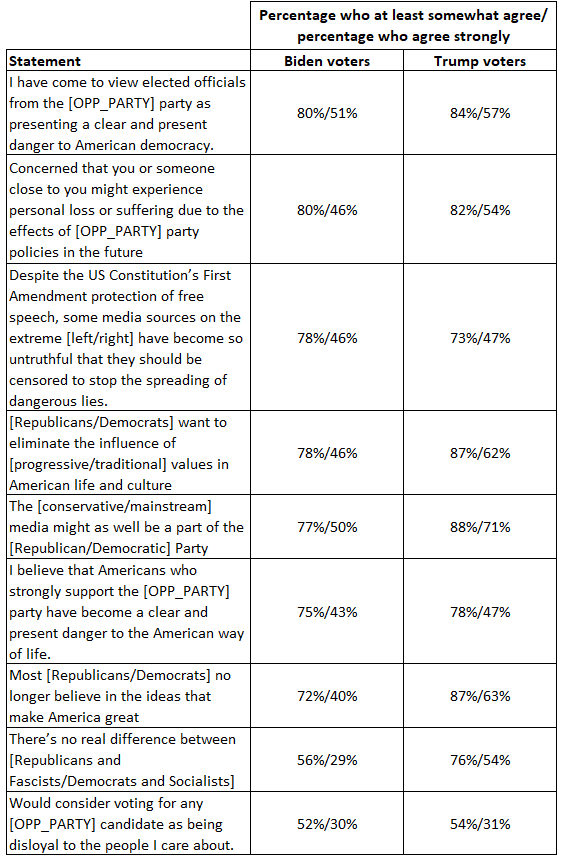
If anything, Table 3 is even worse:
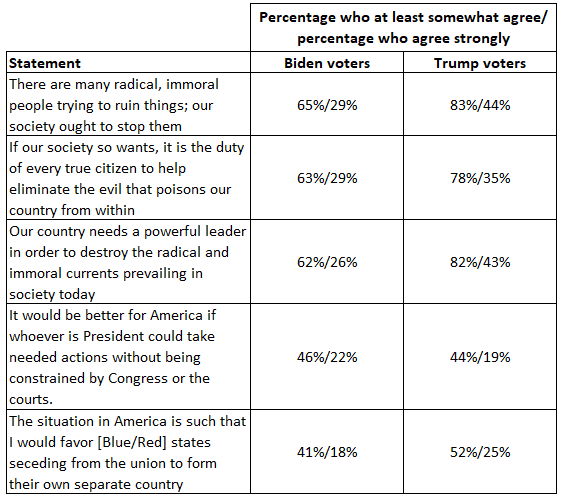
This is a deeply divided country. It’s not at all clear how we can govern it with this little trust in our institutions, our core principles, and our fellow citizens.
My small-c conservative impulse here is devolution. Given a lack of consensus on most issues, we should simply defer making massive policy shifts on a collective basis and instead push power to the lower levels. Let rural America run by rules of its own making and ditto urban America.
But it’s really not that simple. At very least, it’s not completely workable and it’s certainly not satisfying.
I’m not sure we can control a global pandemic with localized rules. Even if we decided to let localities that don’t want to get vaccinated, wear masks, or take other safeguards to prevent viral spread just suffer the consequences of those decisions, they would soon overwhelm the hospitals and other healthcare infrastructure of the urban and suburban areas.
We could, and in some respects have, effectively localized a lot of our social policy. It’s not, therefore, surprising that LGBTQ folks tend to move to metropolitan areas where they’re more welcome. But that option isn’t exactly available to a trans teen in rural Mississippi.
Nor are issues like environmental policy and climate change localized. Actions in one part of the country impact the rest of us.
Even if localization were practical, it’s also rather clear that few would be satisfied simply minding their own business. Most seek more than their own freedom of action but want to impose their values on the broader society. Even aside from the practicalities of the matter, the notion that it’s next to impossible to get a legal abortion in Texas angers people in California and people in Connecticut wearing masks at the grocery store seems to irk people in Florida.
Still, absent a radical change in our political culture that makes consensus possible, I see no practical alternative. Certainly, the creation of a Blue America and a Red America as governing entities is not among them.





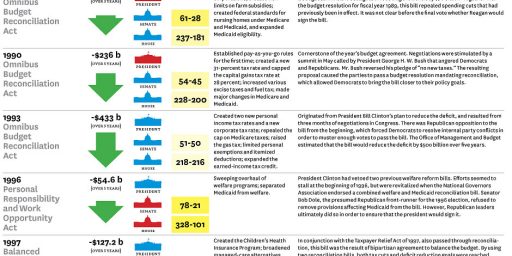
Add to the list of barriers that you’ve mentioned; dividing the national debt, dealing with the distribution of social security payments and the future of the trust fund. Today Blue America effectively subsidizes Red America, what happens to those subsidies. What about defense? Will passports be required to move between BA-RA
The number of issues to dissolution are mind boggling. It would be easier to amend our politics in the manner that rewards consensus rather than zero-sum behavior.
Fucking snowflakes.
The fact that most of the country is purple emphasizes the impossibility of secession and a second Civil War, an idea avidly promoted by a lot of Trumpkins. As I’ve said many times before, who are you going to shoot? Your next door neighbor?
As you note with the COVID example, the ramifications of irresponsible behavior affect everyone, not just the perpetrators.
If we could just let the rural communities stew in their own ignorant juices, that would be one thing, but we are a society. We have responsibilities to each other – and those responsibilities travel even beyond our national borders. Air quality, for example, matters worldwide because it’s impossible to keep U.S. air within the U.S., just like it’s impossible to keep West Virginia COVID sealed up within that state.
The right has demonized collectivism to the point that it’s is now American mythos that we’re all rugged individualists making our own way, independent of the society in which we live. They have persuaded much of the population that they have no responsibility for anybody else.
The left has done a horrible job evangelizing that we’re all in this together, and we lose the narrative to shouts of “socialism” every time we try to repair a bridge or feed a starving kid.
The answer is exceptional leadership, but the job of leadership is so toxic that nobody capable wants to do it.
I, for one, am sick of the break/repair cycle we have in place today in which Democrats build something, the population gets complacent and elects Republicans who then break everything, bringing back the Democrats to repair it all while the R’s scream about how long it’s taking and how much it costs.
There are things we can do short of a new Constitutional Convention. We can restore the fairness doctrine concept, and apply it to a wider range of media – not just licensed airwaves. We can adopt European-style penalties for broadcasting damaging lies. We can put some teeth in our own election laws, perhaps by removing from office anybody caught violating election rules.
We need an Obama-style leader who is wealthy and white if we are going to reach the people who need to be reached. A guy like Mark Cuban could possibly do a good job, but he would destroy his businesses in the process.
@CSK: Yup. Even places that I think of a Trump Country, like Alabama and Mississippi, are pretty damned purple. Hell, even Utah and Wyoming, which have maybe 7 Black people between them, aren’t bright red.
Never mind the practical difficulties. If you are gonna try and take your ball and go home every time some vote doesn’t go your way, we can’t have a democracy. Or a republic.
I know this sounds like a conspiracy theory, but I see this as the work of foreign powers. The Internet Research Agency has a mission statement that describes pretty much exactly this. Rupert Murdoch, in contrast, just wants to be rich, and doesn’t care how.
And of course, there are Americans who play along for money, for power, or because of some sort of righteous zeal. Or for the ego strokes.
Yeah, the third table really bothers me, too.
Usually you look to an outside threat that you can unite against. Covid has killed more Americans than WW1, WW2, Korea and Vietnam put together. It would do nicely. But no, that had to be turned into a partisan politics thing.
@Tony W: You know, I like the idea of making libel suits against, oh, election officials, easier to bring. I like the idea of making it easier to prosecute people for pushing false statements in media, too.
Although, the way Fox News usually works is that they rarely lie outright. It’s all implication and “look over here”. Except for the Dominion thing. They went all in on that. Probably because they were in Dutch because of the Arizona call.
Its at the county level where you see some bright red and blue. But with, very roughly, about 20% of our population rural, 30% urban and 50% suburban this is not a pure division. It might be possible to split up some individual states so that the rural and urban are separated, maybe the ones where you only have one or two really large cities.
Steve
You can add to this the fact that Republicans are by no means monolithic, and many think the idea of secession is ludicrous. A Massachusetts Republican is by no means the same animal as an Alabama Republican. By Trumpian standards, Charlie Baker is a Communist.
I think we should try reservations, you know, like Indian reservations, but for MAGAts. Let’s take, oh, Wyoming. Idaho and eastern Oregon, that should be more than enough. We designate it a Cult Safe Space and encourage, indeed subsidize, any MAGAt who wishes to move there. America’s Gaza strip.
@James Joyner:
There are no states in the Census Bureau’s 13-state western region where African-Americans are the largest minority group. There are several (eg, California) where Blacks aren’t the second largest minority group. In Colorado, where I live, the minority shares of the population are 22% Hispanic, 4% Black, 3% Asian. Very different dynamics in the Democratic Party here than what I observed during the few years when I lived on the East Coast. Note the common assertion that Harris “isn’t Black enough” because her political experience was in California and she lacks some critical background that can’t be acquired there.
@CSK:
It’s a good point. I can’t imagine an elderly Massachusetts Republican wants to trade the Bay State’s health care system for Mississippi’s
@MarkedMan:
No. Particularly since Mississippi had only 9 ICU beds available in the entire state as of Sept.1.
In your lead you make an assertion that dividing the country is “impossible”, yet provide actually no argument for this assertion in the article.
I guess if you make the absurd criteria that every single Republican is in one country and every single Democrat in the other, than yeah, it’s impossible, but by that criteria countries in general impossible. You think there’s no one in the US who would rather be part of Canada or Mexico?
Nevertheless, countries do exist, because there’s clearly parts mostly controlled by the Republicans and parts mostly controlled by the Democrats, and there’s no reason we couldn’t have a “Velvet Revolution” style dissolution the way Czechoslovakia did.
It would have been illuminating if the respondents to this poll were each to have provided a list of a few examples of what they saw as radical, immoral, or evil in the opposition party. I know my biases, but white supremacy and transgender sympathy don’t balance on any moral scale I’ve ever known.
Were Red States to actually secede, we’d have large urban “States of Jones” in all of them. Your first chart shows big support, even among Trump voters, for most of the Biden plan. A majority of GOP voters even favor increasing taxes on the wealthy. Trump voters want a more active government and more progressive taxation. Think about that – Republican voters don’t support the Republican mantra of small government and low taxes. What does that say about R voters and the R party?
Kevin Drum is right, it’s FOX “News”. I check out their website most days. There’s very little news, but a lot of outrage. At the moment the headlines are “AOC defends Pelosi’s failure to advance Biden agenda, far left holds infrastructure vote hostage”, “Texas man chases down carjacker allegedly dragging woman to death”, “Kamala Harris flies to California; White House won’t say why”, and “Canadian pastor warns Americans after arrest for opposition to COVID rules”. And I don’t believe they’ve done a story on the AZ fraudit beyond a 30 sec mention on one of the TV “news” shows. Two local stories, a nothingburger, and a complete twisting of D negotiations. Murdoch discovered he could make a lot of money by abandoning journalistic ethics entirely and telling people only what they want to hear. Is FOX an adjunct of the Republican Party, or is the Party an adjunct of FOX? FOX has been relatively quiet about election lies since Dominion dropped a huge lawsuit on them. Is that approach scaleable?
Talk is cheap and people are fools.
This is the result of an atomized and propagandized population that is, at the same time, saying such stupid things to pollsters while also not being very politically active. I continue to have skepticism at these poll results because what people claim is far different from their actions. We still have a very low level of political violence compare to most of US history, such as the late 1960’s. The division in polling is not being followed up by actions that one would expect to see if people actually and strongly felt this way. People are acting more like sports fans than competing ideological camps on the verge of violence and civil war.
A majority of Americans live in suburbs and that’s been growing for a long time. Biden won largely due to gains in the suburbs where Democrats currently have a small advantage.
And yes, I realize the Census lumps suburbs with urban cores and calls them all “urban.” This obscures things.
Plus the two states with the highest percentage of rural population are both solid blue (Maine and Vermont) and several states with high levels of urbanization (based on the census definition) are still red- Utah, Florida, Texas. Kansas and Minnesota have the same percentage of rural population (~26%) but have very different politics. There are many other examples.
So it’s a lot more complicated than the simplistic urban-rural construct, especially when using the census definition in which urban and suburban are lumped together.
One of my retirement “hobbies” is research into the broad question of whether there are conditions under which the 13-state American West (plus or minus bits and pieces) could become a separate country. I don’t believe today’s red/blue rural/urban largely local differences can drive that. Much more likely would be the regional differences that climate change is going to drive.
The problem with localizing laws to the state level is that in much of the country, rural folks will be making laws for urban folks. And vice versa in the most populous states. If localization is the solution, it needs to be at least county level.
Solution that will never happen:
Split federal taxes into two categories (based on the model of Congress). Lower income tax, but assess it as it is today (the House). The second tax (lets call it the Interstate Trade Tax) will be charged to the individual states and will be required for anyone in that state to trade outside of the state. Every state will be charged the exact same amount (the Senate). These funds can be raised within the states however they want. Consolidation of states with small populations will be encouraged.
@CSK: I gave this a thumbs up, but I wanted to comment and say “thank you” for making this important (and obvious) point.
@andy: Very much agree with you about the “value” of these polls. In my opinion, these are nothing more than emotional thermometers. Which is not to say that they are unimportant.
@andy:
Sure doesn’t seem that way to me. Between the anarchists taking over a section of Portland, BLM marches that turned violent in many American cities, to the fascist and white supremacist Trumpers marching around looking to beat up anyone they can find to, of course, a bunch of violent Republican loons storming the Capitol with intent to murder Democratic leaders. And you go around the Trump states and half the town council or school board meetings have violent man-boys showing up in military gear making threats to officials that they know where their kids go to school. Hell, these gun nuts are showing up fully armed to frickin’ Starbucks to intimidate those who disagree with them.
Sheesh. I was just a kid in the sixties, but this sure as hell seems as violent now as it was then.
@Mimai:
Glad you liked it. One of the great virtues of New England Republicans is that they adhere to the old Yankee tradition of minding their own business, which precludes allying with southern Republicans (again, not all of them, mind you), who are far more disposed to get exercised about things like same-sex marriage and abortion. Whom you decide to wed and how you handle a pregnancy are your affair, and yours alone.
The near-split over the War of 1812 – and there was actual inter-party murder going on – was fundamentally about money. The Civil War was fundamentally about money in the form of slaves. This round is not so much about money, it’s just about hurt feelings, mostly the hurt feelings of less-educated men, with a heaping helping of racism on the side. Is a middle-class Republican family going to war over hurt feefees? Nah. Is a Republican lawyer in Seattle going to war? Nah. A tech bro in Austin? Nah. As @Andy says above, talk is cheap, especially in the age of social media.
The people who want a split are – to use a term of art that used to apply to me – trailer trash. Losers. Losers don’t start revolutions, frustrated intellectuals start revolutions, and greed starts civil wars. (Oversimplifying just a wee bit.) We’ll likely see some domestic terrorism which, along with prosecutions and prison sentences, will weaken the MAGAts.
But the bigger problem for the MAGAts is time. They’re old and getting older. Trump is old and getting older. Tick tock, tick tock, nothing burns at maximum thrust for long. The rising generation doesn’t give a rat’s ass about grandpa’s race resentment or fear of the trans, or tales of how he used to have a good job at a factory and he lost it because: Jews. What they care about now, and will care about with increasing urgency, is climate change. The political paradigm is shifting with generational change.
@Michael Reynolds:
Some of us that want to split up are urban people who are tired of our country continually falling behind other developed countries because we’re chained to the rock of the Confederacy. We won’t be able to start moving forward again until we break that chain.
@Michael Reynolds:
I agree for the most part, but as others have noted in this thread, there’s a market in messaging catered to Losers and there’s power to be had in playing to losers’ grievances. Where there’s a market, there’s greed. Where there’s power, there’s authority. Greed and authority can get you to civil war, if we’re oversimplifying.
I also think timing is key – with the next decade being when things would most likely come to a head. Death throes can be ugly and the rising generation’s urgency will foment lashing out.
@Michael Reynolds:
The way I see monied interest at work here is fossil fuel money. It’s a big influence. Russia is fossil fuel money. But they don’t know that they can make their case directly, so they do it by pushing culture war issues that will get the people friendly to them elected.
Also, the One Percent seeking lower taxes is also a monied interest. The same goes for them, they pursue this indirectly.
But it isn’t the same, for sure.
@Stormy Dragon:
The problem with just losing the Confederacy – and I’m very much with you in spirit – is that those states have large Black populations. I wouldn’t give much for their chances in a neo-confederacy.
Discussion of secession tends to be rather vague. I’m interested in specifics. Is the idea that the current (U)SA would be split in two? That is often implied but not so often specified. If so, what exactly is the breakdown of states? Show your work please.
@Jay L Gischer:
The one percent are not going to back a split or a revolution or a civil war. The one percent are educated, successful and urban. I’m in the one percent, and yesterday I had to write checks to the IRS and FTB (California’s IRS) in amounts that temporarily stopped my breathing. But split the country? Over that? Nah. Money today doesn’t mean slaves and it doesn’t mean land. Money today is brains.
As for fossil fuel industries:
Oil and Gas are not the powers they used to be. That sector is smaller than tech, a bit larger than finance, and equal to tourism. It’s also smaller than real estate, state and local government and on par with health care. And it’s largely confined to Texas and Alaska.
@Michael Reynolds:
The problem is we’re not helping the black people in Mississippi anyways by staying with the Confederacy. All we’re doing is preventing ourselves from helping the black people in Detroit.
It’s kind of like the old water safety rule about if you see someone drowning, you don’t jump in after them because they’re just going to grab you and now you’re both drowning.
After a breakup, we can have universal health care, more equitable taxation, etc. and then we can see about helping people being hurt in the south to migrate to safety. But we have to rescue ourselves before we can rescue them.
The answer, which I know is a fantasy, is significant institutional reform that would lead to more than two parties, and therefore transform the zero-sum nature of our current politics into one that requires more real negotiation between multiple parties (and where the fringe of one party couldn’t essentially take it over).
It would help, too, if there is more fairness in the system. The fact that the minority has outsized influence fuels frustration. It is one thing (still not great) when there are two equal sides duking it out, but it is another (much worse) when there are two sides but the smaller side has more influence. I still think this is the ultimate source of a real crisis.
@Mimai:
If we’re going by states: the west Coast – CA, OR, WA and HI are solidly blue. ME, VT, NH, CT, RI, NY, NJ, MD ditto. IL is solid blue. VA and NC, despite much MAGA sentiment, would end up sticking with the Union, because all their money is blue money. PA would split in two, as would OH. I suspect FL would reject secession because Florida’s gonna drown and they can’t afford to save themselves. Even GA isn’t a gimme for secession.
And as discussed the other day, Texas would be looking at the prospect of singlehandedly paying the bills for AL, MS, AK, LA, KY. Texas is already quivering on the purple line, and once TX taxpayers started to think seriously about it they’d opt for independence from both the US and the neo-confederacy.
Which would leave a bunch of unpopulated states and basket cases to secede.
So, yeah, not happening in the real world.
@CSK:
This is increasingly not the case (certainly not as much as it used to be).
@Michael Reynolds:
The problem is, this requires the voters in TX, AL, MS, AK, LA, KY, etc. to recognize the fact they’re subsidized by blue states when they’ve all convinced themselves they’re actually the most productive parts of the country. I could see something akin to Brexit happening where they all talk themselves into believing they hold all the cards and if they walk away the blue states will be forced to give into all their demands only to discover after the fact that they’ve screwed themselves.
@Stormy Dragon:
It is theoretically impossible? Sure.
In practicality, if you divided out Texas, what do you do with Austin? With Houston? If the point of division is Rep/Dem, this makes no sense.
@Michael Reynolds: I worry more about when Trump is reelected because Georgia throws out the votes in Fulton Co., Arizona refused to certify the vote count, etc. They puts both sides in the camp of not believing that voting matters. And it seems to me that that increases the chance of a civil war much more than just Faux News lies alone.
@Stormy Dragon:
Keep in mind that part of the reason (if not the reason) that these states receive more in federal dollars than they send out is poverty. Specifically, rural poverty and often Black and other minority-based poverty.
So, to threaten Red Alabama that all that welfare isn’g going to the Black Belt counties is not the threat you think it is.
(And it wouldn’t be harming who you think it would be harming).
@Mimai:
Also, for the advocates of secession, what is the stopping rule? The within state variability in ideology, wealth, etc is at least as large as the between state variability. Hence the same “problems” motivating secession will still be present…..and perhaps amplified.
Shall we then start breaking up states etc? Pretty soon you might have stumbled into advocating for a situation like the one that drew so much scorn a few weeks ago…when Mu provoked everyone with a (poorly articulated…sorry Mu it was) defense of Libertarian(ish) values.
@Steven L. Taylor:
Do you mean that Alabama Republicans are becoming more like Mass. Republicans, or vice versa? Can you really see a Mo Brooks or a Tommy Tuberville getting nominated for anything by the Massachusetts Republican Party? All you have to do is mention Donald Trump to Charlie Baker and Baker looks as if he swallowed a hairbrush.
@Steven L. Taylor:
The money isn’t going to the black belt anyways:
Alabama GOP governor signs bills to use Covid-19 relief funds to build prisons into law
This is a perfect example of what I meant earlier when I said staying with the South to help black people in the south isn’t actually helping them. The South mistreats them, we try to send help, and the South takes that money to spend on white people. We could help the black belt more by breaking off and then using the money to help them move north.
@Michael Reynolds: By the way, I’m the 1 percent, too. But you know we are both small fry compared to some of them that’s out there. And the guys who lobby for reduced taxes lobby hard.
I mean, yeah, fossil fuels are declining in importance, which to my mind is exactly why they are fighting so hard. It’s much harder, emotionally, to watch things slip away than it is to lose a couple of points of growth.
And that’s another driver that isn’t a monied interest: The percentage of people in the US who identify as White Christians is declining. It has dropped below 50 percent. Some find that alarming. (Even though I am white, and I am Christian, “White Christian” isn’t really an identity for me, I define Us as something else, something that’s really kind of hazy. So I don’t find the decline alarming.)
@Michael Reynolds: Thank you for being specific (even though I don’t get the sense you are a secessionist). I agree that it’s not going to happen. I also think these discussions further erode the social fabric and accelerate us in the wrong direction.
As an aside, this quip…
…gave me a good chuckle. Median voter says what?
{edited to fix blockquote fail}
If any state has 60% of the people favoring secession, I say let them go. 60% prevents a bare majority from fucking things up like Brexit. Maybe 55%.
I’ll be willing to swap their portion of the national debt for their portion of the social security trust fund. The numbers don’t really work out, but fuck it, we are transferring money into red states on a continual basis now, so we are trading a fixed loss for a continual loss.
Let’s consider the effects: It will encourage the “freedom” loving “patriots” to move there, which will shift some other states from reddish purple to bluish purple. It will remove a few red Senators and House Critters.
It will be a fucking disaster for the states that secede. Meanwhile, the rest of us can get on with our lives.
The alternative is to continue with the asshole’s veto that is our current government, and have the whole country slide into a fucking disaster. But if the dead weight wants to jettison itself, I see no reason to stop them.
And, if they smarten up after a few years of rugged individualism, we can always add a new state or territory.
@Mimai:
To answer your first question, the names and number of those states allegedly ready and eager to secede varies depending on who’s doing the names and counting. For example, Georgia and the Carolinas would be among that number according to some sources. Others say they wouldn’t.
@Mimai:
This question hasn’t been addressed by those advocating secession, so I certainly can’t answer it.
Look, these people are fantasizing about grabbing their guns and watering the Tree of Liberty with the blood of patriots. It’s a pipe dream, a fantasy of keyboard warriors who spend their days hanging out at Lucianne.com. They’re not going to secede because they can’t. And they can’t because they don’t know what the hell they’re doing.
I think the bottom line is that the country is split between rising and falling, winners and losers. Very big changes have come very, very fast. The iPhone is just 14 years old, social media is just 17, rather less when you consider proliferation. Evangelicals are in decline, white men down, rural down, non-college down, but these are just different ways of describing the same population. And who’s rising? Non-religious people, minorities especially Asians and Hispanics, urban and suburban, college educated.
And most important, IMO, the yutes, because the young are always rising. 68 million people are between ages 9 and 24, 72 million between 25 and 40. In the next ten years those two groups will be half of American voters. Would you rather be with the rising generations, or bet against them?
MAGAts are putting up a good fight, but in the end they lose. And as I’ve suggested before, they know they’re going to lose. They’re configured like an army in retreat, fighting delaying actions – gerrymandering, blocking votes, focused on turning out a dwindling population of voters. They’re the Army of Northern Virginia retreating to barricades around Richmond and Petersburg. Ask yourself whether you’ve seen any neo-confederate intellectuals (hah!) laying out plans for their glorious future. Boil it down and it’s the olds vs. the future, losers vs. winners, declining populations vs. increasing populations.
@CSK: I mean GOP voters in both places.
@Stormy Dragon: The reality remains that a lot of the transfer payments back to red states is about things like TANF, WIC, Medicaid, and the like.
@Steven L. Taylor:
But that still doesn’t tell me whether you think Alabama is becoming more like Mass. or the opposite. If it’s the former–which I suspect it isn’t–that’s good. If it’s the latter, I’d dispute it. I live here. I know a fair number of Republicans.
Perhaps by GOP you mean the so-called “base.” I would concede there might be some similarities between the two. But again, the base in Mass. is not obsessing about social issues the way many southern and midwestern Republicans do.
@MarkedMan:
I get what you’re saying, but I think it was objectively worse back then. There were actual political assassinations, domestic terrorist groups planting bombs and killing people, and a much higher general level of violence than exists today. The unrest related to BLM and Charlottesville, etc. aren’t nothing or small potatoes, but they are, in my view, much less than the unrest in the late 60’s and much less than I would expect given that people are talking about secession and voicing hatred of the political “other.”
@Andy:
“…talking about secession and voicing hatred…”
Exactly. And that’s all this crew of boobs is capable of doing.
@Michael Reynolds:
I find this less than comforting. I don’t recall enough about 1812 to discuss it in detail. The Civil War was, indeed about the capital tied up in slaves. The war was driven by major slave owners who succeeded in getting their poor neighbors to fight for them. Rupert Murdoch is making a lot of money off this stuff. Chuckles Koch is saving a lot of money by preventing action on AGW. I suspect they, and others like them, would cheerfully push the rubes into secession.
The most interesting data is from the first chart. What it tells me is that we all agree–Republicans and Democrats alike–on “everything” except:
Higher income tax on the very rich ($400k+)
Universal pre K
Paid family leave
Free Community College
And right to work laws (with FG supporters being in favor)
FG supporters are also slightly less likely to be in favor of rural broadband service being assisted by government.
What does this show us? Unsurprisingly, that FG’s supporters (hence conservatives) favor government spending that benefits them and reject being asked to pay for things that they will not benefit from. And some of the situations for which they pretty strongly object are points that they can make legitimate arguments for. People should be able to save against the possibility of needing leave time or time away from work in the event of a new family member.
Then again, in the past, a second income (except in extreme circumstances) paid for “the extras”–remodeling the family home, nicer vacations, (in my family) trips to Ireland and Hawaii, an easier post-secondary education for the kiddos–instead of food like they do now. That FGers are not in favor of raising taxes is not surprising; who is? Being slightly against rural broadband probably indicates that larger numbers of them live in cities. In any event, the distinctions show that for the most part what conservatives and liberals disagree on is preservation of the status quo–with conservatives being opposed to government doing things that may give people who are not them a boot strap to pull themselves up on. (Let they get their own damn bootstrap! And being pro right to work also lessens the possibility that anyone will be likely to get their own bootstrap. Win-win!)
This is not a problem that can be fixed or papered over. What I find most interesting is why FG supporters want to live in the kind of nation their preferences show they support. And if they really want to live that way, why they don’t just move to the third world? (Yeah, I really do know the answer to that one. 😉 ) I guess everybody thinks they’re really an undiscovered member of the elite at heart.
@gVOR08:
Koch would likely not enjoy having his businesses taxed at a much higher rate everywhere he does business that doesn’t secede.
He might live in Kansas (as much as one can call that living), but his empire is much larger.
@Just nutha ignint cracker:
Or that they don’t want the cities and “urban values” to come to rural areas.
Or that they believe their own bullshit.
@Michael Reynolds:
I’m not so sure the change has been rapid and solely over the past couple of decades.
Looking at the statistics on both sides of the Atlantic, the old industrial centres have been in steady decline since the 1970’s.
Impacted both by upcoming industrial area: Italy, Japan, Mexico, Brazil, then Korea, China, India, and now even those are offloading labour-intesive areas to e.g. Vietnam.
And the continuing pressure of automation.
The impact seems to have become more become more marked, more general, in the post-millennial period.
I think it’s that a steady erosion eventually become generally recognised as a problem.
One aspect is that in more prosperous areas rising housing costs have tended to extrude the working class from property ownership, in a reversion to pre-1950’s conditions.
And the relentless quest for efficiency in supply chains has meant the increasing subordination of labour to process: zero hour contracts, casualisation, faux self-employment, nigh infinitely propagating sub-contaction, agency labour, de-unionization, “gig economy” etc etc.
This was something manufacturing went through in the period of the industrial revolutions.
The late 20th/early 21st centuries have extended it to retailing, logistics and other services.
Interestingly enough, Texas Monthly has an article in this month’s issue which discusses the question: Why are more Latinos voting Republican? The answer: the attitude of some Democrats (in TX and at the national level) is to lump “Tejanos” (many of whose ancestors have lived in Texas since it was a Spanish colonial possession) with immigrants and Latinos in other regions. The remedy: Democrats need to build a strong ground game that will reach the Tejanos and address their specific concerns.
@Michael Reynolds: If we are dealing in speculative fiction here, I wouldn’t rule out that the Neo-Confederacy ends up with the whiny white man-boys under the heel of the black population. This isn’t 1860 and any blacks that wanted to take up arms against the Klan boys would have no shortage of guns and ammo coming in from all over the world.
@Michael Reynolds:
I think there may be a monetary component.
My “anecdata” comes from England, so may not apply in the US; but there are a lot of English independent retailers, specialist distributors, small manufacturers that are barely trading water due to the internet effect, relentless efficiency seeking in the supply chains, the ongoing impact of private wealth leveraged buyouts, etc.
Summed over the country that probably adds up to a lot of prosperous to moderately wealthy folks who are looking at a massive hit to their effective wealth.
Not likely to be happy about it.
@BugManDan:
You guys need VAT.
Trust me on this.
(Oh, and wealth/capital gains taxes)
@Steven L. Taylor:
Which are likewise manipulated by Southern states to prevent minorities from benefiting from them. As a particular example, Kentucky passed rather grueling work requirements to be eligible for Medicaid and then gave all the majority white counties in the state waivers from the requirements.
Repeating myself, but precious fucking snowflakes need to grow the fuck up and realize we are in this together.
@gVOR08:
I just recently moved to Alabama and during a discussion of politics an adult human said if you take infowars and Newsmax the truth is probably somewhere in between, and others in the conversation agreed. I simply don’t know where the Overton window is down here. They’ve soured on fox news they don’t even trust Newsmax now.
@Michael Reynolds:
From the outside it still looks like its about money — who controls it, how its taxed, what its spent on. Possibly I’m overly cynical, but I find it hard to believe the majority of either Republicans or Democrats don’t care about money. In fact I suspect most of the right-wing media sites (Breitbart, National Review, Fox) aim their articles at generating eyeballs and making money, and would instantly change their tone if that’s the way the money pointed.
But what happens if somewhere, Republicans use the new election rules they passed in different red states to change election results in their jurisdiction and that changes the national election results? Enough Republican lawmakers side with it (or just don’t do anything) to make it a legislative standoff. What happens then? Rely on the SC to make the right decision? And what if the SC decision (whatever it is) is not accepted by one side? What happens then? Does the real winning side accept some accomodation with the lying losers to avoid civil unrest and thus start the death of democracy here? Or Does the winning side insist on respecting the constitutional results and head down the road to civil unrest and possible outright civil war? I’m not an elections expert, is the scenario above even possible? Secession and civil war doesn’t have to follow the current state/jurisdictional boundaries like the Civil War did and be a formal process of existing states declaring secession, etc. It may be more organic.